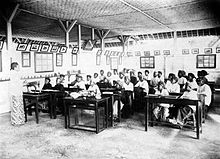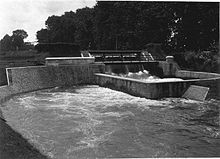- Dutch Ethical Policy
-
This article is part of the
History of Indonesia series
See also:
Timeline of Indonesian History Prehistory Early kingdoms Kutai (4th century) Tarumanagara (358–669) Kalingga (6th–7th century) Srivijaya (7th–13th centuries) Sailendra (8th–9th centuries) Sunda Kingdom (669–1579) Medang Kingdom (752–1045) Kediri (1045–1221) Singhasari (1222–1292) Majapahit (1293–1500) The rise of Muslim states Spread of Islam (1200–1600) Sultanate of Ternate (1257–present) Malacca Sultanate (1400–1511) Sultanate of Demak (1475–1548) Aceh Sultanate (1496–1903) Sultanate of Banten (1526–1813) Mataram Sultanate (1500s–1700s) European colonization The Portuguese (1512–1850) Dutch East India Co. (1602–1800) Dutch East Indies (1800–1942) The emergence of Indonesia National awakening (1908–1942) Japanese occupation (1942–45) National revolution (1945–50) Independent Indonesia Liberal democracy (1950–57) Guided Democracy (1957–65) Start of the New Order (1965–66) The New Order (1966–98) Reformasi era (1998–present) The Dutch Ethical Policy (Ethische Politiek) was the official policy of colonial government of Indonesia during the four decades from 1901 until the Japanese occupation of 1942. In 1901, the Dutch Queen Wilhelmina announced that the Netherlands accepted an ethical responsibility for the welfare of their colonial subjects. This announcement was a sharp contrast with the former official doctrine that Indonesia was a wingewest (region for making profit). It also marked the start of modern development policy; whereas other colonial powers talked of a civilizing mission, which mainly involved spreading their culture to colonized peoples.
The Dutch Ethical Policy emphasised improvement in material living conditions. The policy suffered, however, from serious underfunding, inflated expectations and lack of acceptance in the Dutch colonial establishment, and it had largely ceased to exist by the onset of the Great Depression in 1930.[1][2]
Contents
Formulation of the Dutch Ethical Policy
 Students in Agricultural school for Indonesians in Java. The school was built during this period.
Students in Agricultural school for Indonesians in Java. The school was built during this period. See also: Cultivation System
See also: Cultivation SystemIn 1899, the liberal Dutch lawyer Conrad Theodor van Deventer published an essay in the Dutch journal De Gids which claimed that the Colonial Government had a moral responsibility to return the wealth that the Dutch had received from the East Indies to the indigenous population.
Pieter Brooshooft (1845-1921),[3] a journalist wrote about the moral duty of the Dutch to provide more for the peoples of the Indies. With the support of socialists and concerned middle class Dutch, he campaigned against what he saw as the unjustness of the colonial surplus. He described the Indies indigenous peoples as "childlike" and in need of assistance not oppression. Newspapers were one of the few mediums of Indies communication to the Dutch parliament, and as editor of the De Locomotief, the largest of the Dutch-language newspapers in the Indies, he published writing by Snouck Hurgronje on understanding Indonesians. Brooshooft sent reporters across the archipelago to report on local developments who reported on the poverty, crop failure, famine and epidemics in 1900. Lawyers and politicians supportive of Brooshooft's campaigning had an audience with Quuen Wilhelmina and argued that the Netherlands owed the peoples of the Indies a 'debt of honour'.[4]
In 1901, the Queen, under advice from her prime minister of the Christian Anti-Revolutionary Party, formally declared a benevolent "Ethical Policy" which was aimed at bringing progress and prosperity to the peoples of the Indies. The Dutch conquest of the Indies brought the it together as a single colonial entity by the early twentieth century which was fundamental to the policy's implementation.[5]
Proponents of the Ethical Policy argued that financial transfers should not be made to Holland while conditions for the indigenous peoples of the archipelago were poor.
Aims
The supporters of the Ethical Policy were concerned about the social and cultural conditions holding back the native population. They tried to raise awareness among the natives of the need to free themselves from the fetters of the feudal system and to develop themselves along Western lines.
On 17 September 1901, in a formal speech to parliament, the newly crowned Queen Wilhelmina formally articulated the new policy - that the Dutch Government had a moral obligation to the native people of the Dutch East Indies that could be summarised in the 'Three Policies' of Irrigation, Transmigration and Education.
Irrigation
 Irrigation waterworks in Jember, East Java, built ca. 1927-1929.
Irrigation waterworks in Jember, East Java, built ca. 1927-1929.
The Ethical Policy promoted efforts to improve the lot of the ordinary people through irrigation programmes, the introduction of banking services for the native population, and subsidies for native industries and handicrafts.
Migration
The Ethical Policy first introduced the concept of transmigration from over-populated Java to the less densely populated areas of Sumatra and Kalimantan, beginning with government-sponsored schemes from 1905 onwards. However the numbers of people moved during the period of the Ethical Policy was a tiny fraction of the increase in population in Java during the same period.
Education
 Group portrait of indigenous children attending the Koning Willem III school, Weltevreden, Batavia, 1919-1920.
Group portrait of indigenous children attending the Koning Willem III school, Weltevreden, Batavia, 1919-1920.
The opening of Western education to indigenous Indonesians began only at the beginning of the twentieth century; in 1900, only 1,500 went to European schools compared to 13,000 Europeans. By 1928, however, 75,000 Indonesians had completed Western primary education and nearly 6,500 secondary school, although this was still a tiny proportion of the population.[6] JH Abendanon (1852–1925) was the Minister for Culture, Religion and Industry from 1900 to 1905 when schools were built for both the nobility and ordinary people in almost every region.[citation needed]
Assessment of the Policy
The Ethical Policy was the first serious effort to create programmes for economic development in the tropics. It differed from the "civilizing mission" of other colonial powers in emphasising material welfare rather than a transfer of culture. The educational component of the Policy was mainly technical; it did not aim at creating brown Dutchmen and women. The Policy foundered on two problems. First, the budgets allocated to the Policy's programmes were never sufficient to achieve its aims, with the result that many colonial officials became disillusioned with the possibility of achieving lasting progress. The financial stringencies of the Great Depression put a definitive end to the Policy. Second, the educational programmes of the Policy contributed significantly to the Indonesian National Revival, giving Indonesians the intellectual tools to organize and to articulate their objections to colonial rule. As a result, many in the colonial establishment saw the Ethical Policy as a mistake that was counter to Dutch interests.[7]
See also
- History of Indonesia
- Indonesian National Revolution
- Dutch East Indies
- Dutch Empire
- Cultivation System
References
General references and further reading
- Robert Cribb, 'Development policy in the early 20th century', in Jan-Paul Dirkse, Frans Hüsken and Mario Rutten, eds, Development and social welfare: Indonesia’s experiences under the New Order (Leiden: Koninklijk Instituut voor Taal-, Land- en Volkenkunde, 1993), pp. 225-245.[1]
Notes
- ^ Robert Cribb, 'Development policy in the early 20th century', in Jan-Paul Dirkse, Frans Hüsken and Mario Rutten, eds, Development and social welfare: Indonesia’s experiences under the New Order (Leiden: Koninklijk Instituut voor Taal-, Land- en Volkenkunde, 1993), pp. 225-245.
- ^ Ricklefs, M.C. (1991). A History of Modern Indonesia since c.1300. London: MacMillan. p. 151. ISBN 0-33-579690-X.
- ^ Vickers, Adrian (2005). A History of Modern Indonesia. Cambridge University Press. p. 17. ISBN 0-521-54262-6.
- ^ Vickers, Adrian (2005). A History of Modern Indonesia. Cambridge University Press. p. 17. ISBN 0-521-54262-6.
- ^ Vickers, Adrian (2005). A History of Modern Indonesia. Cambridge University Press. p. 18. ISBN 0-521-54262-6.
- ^ Vickers, Adrian (2005). A History of Modern Indonesia. Cambridge University Press. p. 40. ISBN 0-521-54262-6.
- ^ Robert Cribb, 'Development policy in the early 20th century', in Jan-Paul Dirkse, Frans Hüsken and Mario Rutten, eds, Development and social welfare: Indonesia’s experiences under the New Order (Leiden: Koninklijk Instituut voor Taal-, Land- en Volkenkunde, 1993), pp. 225-245.
External links
Categories:- Dutch East Indies
- Economic history of Indonesia
Wikimedia Foundation. 2010.
